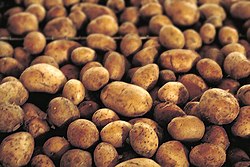馬鈴薯
Chinese
| bell tied to a horse; sleigh bell; jingle bell | potato; yam | ||
|---|---|---|---|
| trad. (馬鈴薯) | 馬鈴 | 薯 | |
| simp. (马铃薯) | 马铃 | 薯 | |
Etymology
The earliest known attestation in Chinese is found in the Kangxi edition of the Gazetteer of Songxi County (《松溪縣志》), published in 1700, but based on its description, it is improbable that it referred to the potato but, instead, referred to the air potato (Dioscorea bulbifera(Please check if this is already defined at target. Replace {{taxlink}} with {{taxfmt}} if already defined. Add nomul=1 if not defined.)) (Xiang, 2018). The name probably originally made reference to the way air potatoes look like bells used in the tack for horses.
Alternatively, considering this word is mainly distributed in the South, and that other forms in the area, such as 荷蘭薯/荷兰薯 and 番仔番薯, usually include a modifier meaning “foreign”, Suzuki (2013) suggests that 馬鈴/马铃 (mǎlíng) may be a variant of 馬來/马来 (Mǎlái, “Malay”).
Pronunciation
- Mandarin
- Cantonese (Jyutping): maa5 ling4 syu4
- Hakka
- Northern Min (KCR): mǎ-lâing-cṳ̂
- Southern Min
- (Hokkien, POJ): má-lêng-chû / má-lêng-chîr / má-lêng-chî / bé-lêng-chû / bé-lêng-chîr / bé-lêng-chî
- (Teochew, Peng'im): bhê2 lêng5 ze5 / bhê2 lêng1 ze5
- Mandarin
- (Standard Chinese)+
- Hanyu Pinyin:
- Zhuyin: ㄇㄚˇ ㄌㄧㄥˊ ㄕㄨˇ
- Tongyong Pinyin: mǎlíngshǔ
- Wade–Giles: ma3-ling2-shu3
- Yale: mǎ-líng-shǔ
- Gwoyeu Romatzyh: maalingshuu
- Palladius: малиншу (malinšu)
- Sinological IPA (key): /mä²¹⁴⁻²¹ liŋ³⁵ ʂu²¹⁴⁻²¹⁽⁴⁾/
- (Standard Chinese)+
- Cantonese
- (Standard Cantonese, Guangzhou–Hong Kong)+
- Jyutping: maa5 ling4 syu4
- Yale: máh lìhng syùh
- Cantonese Pinyin: maa5 ling4 sy4
- Guangdong Romanization: ma5 ling4 xu4
- Sinological IPA (key): /maː¹³ lɪŋ²¹ syː²¹/
- (Standard Cantonese, Guangzhou–Hong Kong)+
- Hakka
- (Sixian, incl. Miaoli and Neipu)
- Pha̍k-fa-sṳ: mâ-làng-sù
- Hakka Romanization System: maˊ langˇ suˇ
- Hagfa Pinyim: ma1 lang2 su2
- Sinological IPA: /ma²⁴ laŋ¹¹ su¹¹/
- (Meixian)
- (Sixian, incl. Miaoli and Neipu)
- Northern Min
- (Jian'ou)
- Kienning Colloquial Romanized: mǎ-lâing-cṳ̂
- Sinological IPA (key): /ma²¹ laiŋ³³ t͡sy³³/
- (Jian'ou)
- Southern Min
- (Hokkien: Xiamen, Taipei, Tainan, Magong)
- Pe̍h-ōe-jī: má-lêng-chû
- Tâi-lô: má-lîng-tsû
- Phofsit Daibuun: maflengzuu
- IPA (Taipei): /mã⁵³⁻⁴⁴ liɪŋ²⁴⁻¹¹ t͡su²⁴/
- IPA (Tainan): /mã⁵³⁻⁵⁵ liɪŋ²⁴⁻³³ t͡su²⁴/
- IPA (Xiamen): /mã⁵³⁻⁴⁴ liɪŋ²⁴⁻²² t͡su²⁴/
- (Hokkien: Quanzhou, Lukang, Sanxia, Hsinchu)
- Pe̍h-ōe-jī: má-lêng-chîr
- Tâi-lô: má-lîng-tsîr
- IPA (Lukang): /mã⁵⁵⁻³⁵ liɪŋ²⁴⁻²² t͡sɨ²⁴/
- IPA (Quanzhou): /mã⁵⁵⁴⁻²⁴ liɪŋ²⁴⁻²² t͡sɯ²⁴/
- (Hokkien: Zhangzhou, Kaohsiung, Yilan)
- Pe̍h-ōe-jī: má-lêng-chî
- Tâi-lô: má-lîng-tsî
- Phofsit Daibuun: maflengcii
- IPA (Zhangzhou): /mã⁵³⁻⁴⁴ liɪŋ¹³⁻²² t͡si¹³/
- IPA (Kaohsiung): /mã⁴¹⁻⁴⁴ liɪŋ²³⁻³³ t͡si²³/
- IPA (Yilan): /mã⁵³⁻⁵⁵ liɪŋ²⁴⁻³³ t͡si²⁴/
- (Hokkien: variant in Taiwan)
- Pe̍h-ōe-jī: bé-lêng-chû
- Tâi-lô: bé-lîng-tsû
- Phofsit Daibuun: beflengzuu
- IPA (Taipei): /be⁵³⁻⁴⁴ liɪŋ²⁴⁻¹¹ t͡su²⁴/
- (Hokkien: Lukang)
- Pe̍h-ōe-jī: bé-lêng-chîr
- Tâi-lô: bé-lîng-tsîr
- IPA (Lukang): /be⁵⁵⁻³⁵ liɪŋ²⁴⁻²² t͡sɨ²⁴/
- (Hokkien: Taichung)
- Pe̍h-ōe-jī: bé-lêng-chî
- Tâi-lô: bé-lîng-tsî
- Phofsit Daibuun: beflengcii
- (Teochew)
- Peng'im: bhê2 lêng5 ze5 / bhê2 lêng1 ze5
- Pe̍h-ōe-jī-like: bé lêng tsṳ̂ / bé leng tsṳ̂
- Sinological IPA (key): /be⁵²⁻³⁵ leŋ⁵⁵⁻¹¹ t͡sɯ⁵⁵/, /be⁵²⁻³⁵ leŋ³³⁻²³ t͡sɯ⁵⁵/
- (Hokkien: Xiamen, Taipei, Tainan, Magong)
Noun
(deprecated template usage) 馬鈴薯
Synonyms
Derived terms
Lua error in Module:zh/templates at line 32: This template has been deprecated. Please use Template:col3 instead.
Descendants
- → Lingao: ma⁴ liŋ¹ su⁴
- → Zhuang: majlingzsuz
Japanese

| Kanji in this term | ||
|---|---|---|
| 馬 | 鈴 | 薯 |
| ば Grade: 2 |
れい Grade: S |
しょ Hyōgai |
| on'yomi | ||
Etymology
Origin unclear. Attributed to noted Edo-period botanist and scholar of Chinese medicine Ono Ranzan (see (deprecated template usage) 小野蘭山) in the late 1700s. May be from (deprecated template usage) [etyl] Lua error in Module:parameters at line 360: Parameter 1 should be a valid language or etymology language code; the value "zhx" is not valid. See WT:LOL and WT:LOL/E. 馬鈴薯/马铃薯 (mǎlíngshǔ), or may be a Japanese coinage later borrowed into Chinese.
According to one theory, this word is a compound of 馬鈴 (barei, “horse bell”) + 薯 (sho, “potato”), from the way the potato looks a bit like the bells used in the tack for stage horses.[1] In another theory, 馬鈴 (barei) is an example of ateji for Malay, since potatoes were introduced to Japan via the Dutch East Indies.
Pronunciation
Lua error in Module:parameters at line 828: Parameter "yomi" is not used by this template.
Noun
Synonyms
Derived terms
References
- ^ Shōgaku Tosho (1988) 国語大辞典(新装版) [Unabridged Dictionary of Japanese (Revised Edition)] (in Japanese), Tōkyō: Shogakukan, →ISBN
- Entries with redundant template: taxlink
- Chinese lemmas
- Mandarin lemmas
- Cantonese lemmas
- Hakka lemmas
- Northern Min lemmas
- Hokkien lemmas
- Teochew lemmas
- Chinese nouns
- Mandarin nouns
- Cantonese nouns
- Hakka nouns
- Northern Min nouns
- Hokkien nouns
- Teochew nouns
- Chinese terms with IPA pronunciation
- Chinese terms spelled with 馬
- Chinese terms spelled with 鈴
- Chinese terms spelled with 薯
- Advanced Mandarin
- zh:Vegetables
- Japanese terms spelled with 馬 read as ば
- Japanese terms spelled with 鈴 read as れい
- Japanese terms spelled with 薯 read as しょ
- Japanese terms read with on'yomi
- Japanese compound terms
- Japanese lemmas
- Japanese nouns
- Japanese terms spelled with second grade kanji
- Japanese terms spelled with secondary school kanji
- Japanese terms spelled with hyōgai kanji
- Japanese terms with 3 kanji
- Japanese entries with topic categories using raw markup
- ja:Vegetables
